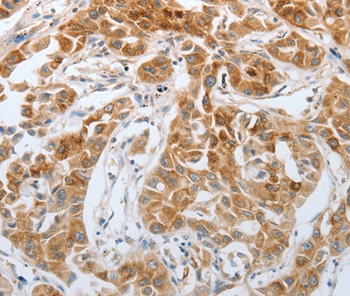

| WB | 咨询技术 | Human,Mouse,Rat |
| IF | 咨询技术 | Human,Mouse,Rat |
| IHC | 1/50-1/200 | Human,Mouse,Rat |
| ICC | 技术咨询 | Human,Mouse,Rat |
| FCM | 咨询技术 | Human,Mouse,Rat |
| Elisa | 咨询技术 | Human,Mouse,Rat |
| Aliases | ASY; NSP; NOGO; NOGOC; RTN-X; NOGO-A; NSP-CL; Nogo-B; Nogo-C; RTN4-A; RTN4-C; RTN4-B1; RTN4-B2; NI220/250; Nbla00271; Nbla10545 |
| Entrez GeneID | 57142; |
| WB Predicted band size | 40kDa |
| Host/Isotype | Rabbit IgG |
| Antibody Type | Primary antibody |
| Storage | Store at 4°C short term. Aliquot and store at -20°C long term. Avoid freeze/thaw cycles. |
| Species Reactivity | Human,Mouse |
| Immunogen | Synthetic peptide corresponding to residues near the C terminal of human Reticulon 4 |
| Formulation | Purified antibody in PBS with 0.05% sodium azide. |
+ +
以下是关于RTN4抗体的3篇代表性文献概览:
---
1. **文献名称**:*Nogo-A is a myelin-associated neurite outgrowth inhibitor and an antigen for monoclonal antibody IN-1*
**作者**:Chen, M.S., Huber, A.B., van der Haar, M.E., et al.
**摘要**:该研究首次克隆并鉴定了RTN4/Nogo-A蛋白,证明其通过髓鞘抑制轴突再生。开发了单克隆抗体IN-1.实验显示其能中和Nogo-A的抑制作用,促进脊髓损伤模型中的神经突生长和功能恢复。
2. **文献名称**:*Antibody against neurite outgrowth inhibitor Nogo-A improves regeneration after spinal cord injury*
**作者**:Bregman, B.S., Kunkel-Bagden, E., Schnell, L., et al.
**摘要**:研究利用抗RTN4/Nogo-A抗体(IN-1)在大鼠脊髓损伤模型中阻断抑制信号,结果显示轴突再生增强,运动功能显著改善,为抗体治疗神经损伤提供了实验依据。
3. **文献名称**:*Nogo and Nogo receptor: relevance to CNS disorders and therapeutic potential*
**作者**:Schwab, M.E.
**摘要**:综述了RTN4/Nogo蛋白及其受体在神经退行性疾病(如多发性硬化症)中的作用,探讨抗Nogo抗体的潜在治疗应用,强调其在促进神经可塑性和修复中的机制。
---
这些文献涵盖了RTN4抗体的基础发现、治疗应用及机制解析,经典研究与综述结合,提供多角度参考。
RTN4. also known as Reticulon 4 or Nogo, is a member of the reticulon protein family, which is predominantly localized in the endoplasmic reticulum (ER). It plays a role in regulating ER membrane curvature and tubular network formation. RTN4 exists in multiple isoforms (RTN4-A, RTN4-B, RTN4-C) generated by alternative splicing, with RTN4-A (Nogo-A) being the most studied due to its distinct N-terminal domain. RTN4 is widely expressed in the nervous system, where it has been implicated in inhibiting axon regeneration and neuronal plasticity by interacting with the Nogo receptor (NgR1) and its co-receptors. This inhibitory activity is critical in both physiological conditions, such as stabilizing neural circuits, and pathological contexts, including spinal cord injury and neurodegenerative diseases.
Antibodies targeting RTN4 are essential tools for studying its expression, localization, and functional roles. They are widely used in immunohistochemistry, Western blotting, and immunoprecipitation to investigate RTN4's involvement in neurological disorders, cancer (e.g., tumor suppression or metastasis), and cellular processes like apoptosis and autophagy. Neutralizing antibodies against RTN4 have also been explored therapeutically to promote axonal repair in spinal injuries. However, challenges remain in ensuring isoform specificity and minimizing cross-reactivity due to structural similarities among reticulon family members. Research on RTN4 antibodies continues to advance understanding of its dual roles in neuroprotection and pathology.
×